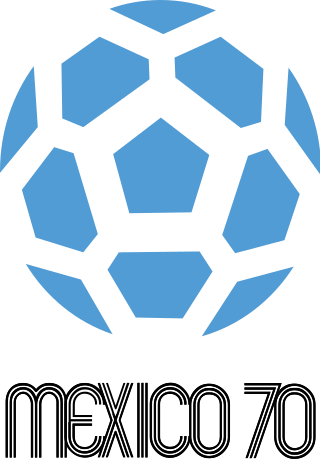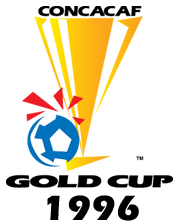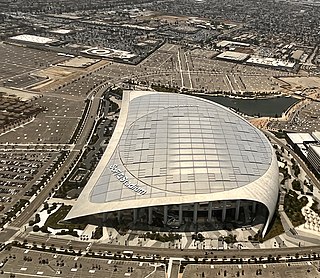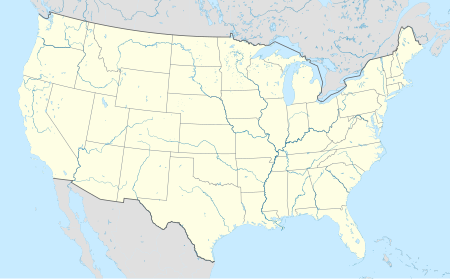
The 1994 FIFA World Cup was the 15th FIFA World Cup, the world championship for men's national soccer teams. It was hosted by the United States and took place from June 17 to July 17, 1994, at nine venues across the country. The United States was chosen as the host by FIFA on July 4, 1988. Despite soccer's relative lack of popularity in the host nation, the tournament was the most financially successful in World Cup history. It broke tournament records with overall attendance of 3,587,538 and an average of 68,991 per game, figures that stand unsurpassed as of 2022, despite the expansion of the competition from 24 to 32 teams starting with the 1998 World Cup.

The 1970 FIFA World Cup was the 9th edition of the FIFA World Cup, the quadrennial international football championship for men's senior national teams. Held from 31 May to 21 June in Mexico, it was the first World Cup tournament held outside Europe and South America, and also the first held in North America. Teams representing 75 nations from all six populated continents entered the competition, and its qualification rounds began in May 1968. Fourteen teams qualified from this process to join host nation Mexico and defending champions England in the 16-team final tournament. El Salvador, Israel and Morocco made their debut appearances at the final stage.

The 1986 FIFA World Cup was the 13th FIFA World Cup, a quadrennial football tournament for men's senior national teams. It was played in Mexico from 31 May to 29 June 1986. The tournament was the second to feature a 24-team format. Colombia had been originally chosen to host the competition by FIFA but, largely due to economic reasons, was not able to do so, and resigned in November 1982. Mexico was selected as the new host in May 1983, and became the first country to host the World Cup more than once, after previously hosting the 1970 edition.

The 1999 FIFA Women's World Cup was the third edition of the FIFA Women's World Cup, the world championship for women's national soccer teams. It was hosted as well as won by the United States and took place from June 19 to July 10, 1999, at eight venues across the country. The tournament was the most successful FIFA Women's World Cup in terms of attendance, television ratings, and public interest.

The 1991 CONCACAF Gold Cup was the first edition of the Gold Cup, the soccer championship of North America, Central America and the Caribbean (CONCACAF), and the eleventh overall CONCACAF tournament. The last time the CONCACAF Championship was held was 1971, from that point on the first-place finishers of World Cup qualifying were considered continental champions.

The 1996 CONCACAF Gold Cup was the third edition of the Gold Cup, the soccer championship of North America, Central America and the Caribbean (CONCACAF).
The 1998 CONCACAF Gold Cup was the fourth edition of the Gold Cup, the soccer championship for the member associations of CONCACAF, which governs the sport in North America, Central America, and the Caribbean.
The 2000 CONCACAF Gold Cup was the fifth edition of the Gold Cup, the soccer championship of North America, Central America and the Caribbean (CONCACAF), and the 15th overall CONCACAF tournament. It was held in Los Angeles, Miami, and San Diego in the United States. The format of the tournament changed from 1998; it was expanded to twelve teams, split into four groups of three. The top two teams in each group would advance to the quarter-finals. Peru and Colombia were invited from CONMEBOL, and the Republic of Korea was invited from AFC.

The 2005 CONCACAF Gold Cup was the eighth edition of the Gold Cup, the soccer championship of North America, Central America and the Caribbean (CONCACAF). It was contested in the United States in July 2005. The United States emerged victorious in the final against an upstart Panama team led by tournament MVP Luis Tejada. After regulation and 30 minutes of extra time ended scoreless, the U.S. won 3–1 on penalties.
The 2000 Nike United States Cup , a Nike-sponsored, United States Soccer Federation (USSF)-organized international football tournament, took place in June 2000. It was the seventh and last U.S. Cup in the series, which began in 1992.
The 1999 Nike U.S. Cup was a four-nation invitational tournament sponsored by Nike, Inc. and organized by the United States Soccer Federation (USSF) in March 1999. The four teams included the host United States, Mexico, Bolivia and Guatemala. This year, Guatemala was making its first and only appearance in the cup, Bolivia was playing in its second cup and Mexico was appearing for the third time, having won the last two editions, in 1996 and 1997. Mexico would win again this year, for its third consecutive title. While in previous years, the U.S. cup featured four teams in a round robin tournament, with the team having the best record claiming the title, this year USSF elected to use a two-game double header format. The winners of the first two games met for the title in the first game of the second doubleheader while the losers in the first two games played each other in the second doubleheader's later game.
The 1989 CONCACAF Championship was the tenth and final edition of the CONCACAF Championship held under the format of serving as qualification to the 1990 FIFA World Cup and having no host nation for the final round. The tournament would be succeeded by the CONCACAF Gold Cup in 1991.
The 1976 U.S.A. Bicentennial Cup Tournament was an international association football competition, which took place in May 1976 in the United States. The tournament featured several World Cup stars both past and future.

The 2009 CONCACAF Gold Cup was the tenth edition of the CONCACAF Gold Cup competition, and the twentieth soccer championship of North America, Central America and the Caribbean (CONCACAF). It was played from July 3 to 26, 2009 in the United States. This competition was the fourth tournament without guests from other confederations. Mexico won their fifth Gold Cup, and eighth CONCACAF Championship overall, after beating the United States 5–0 in the final. It was the second consecutive Gold Cup final and fourth overall to feature Mexico and the United States and the third won by Mexico.

The 1998 CONCACAF Gold Cup final was a soccer match to determine the winners of the 1998 CONCACAF Gold Cup. The match was held at the Los Angeles Memorial Coliseum in Los Angeles, United States, on February 15, 1998, and was contested by the winners of the semi-finals, the United States and Mexico. Mexico, who had won both 1993 CONCACAF Gold Cup and 1996 tournaments, successfully defended their title with a 1–0 win over North American rivals United States. A total of 91,255 fans, described as a "heavily pro-Mexico crowd", watched the match at the Los Angeles Memorial Coliseum.

The 2014 Copa Centroamericana was the 13th Copa Centroamericana, the regional championship for men's national association football teams in Central America. It was organized by the Unión Centroamericana de Fútbol or UNCAF, and took place in the United States.

The United States national team has participated in all seventeen editions of the CONCACAF Gold Cup since its foundation in 1991 to replace the CONCACAF Championship. The United States is also the second-most successful team in the tournament, having won seven titles since the beginning of the Gold Cup, behind Mexico by just two titles. Before the Gold Cup however, the United States only qualified for two of the previous ten CONCACAF Championships.
The CONCACAF Gold Cup is North America's major tournament in senior men's football and determines the continental champion. Until 1989, the tournament was known as CONCACAF Championship. It is currently held every two years. In earlier editions, the continental championship was held in different countries, but since the inception of the Gold Cup in 1991, the United States are constant hosts or co-hosts.

The 2023 CONCACAF Gold Cup was the 17th edition of the CONCACAF Gold Cup, the biennial international men's soccer championship of the North, Central American and Caribbean region organized by CONCACAF. Canada and the United States hosted the tournament, which began on June 24, 2023.

The 2023 CONCACAF Men’s Gold Cup final was a soccer match to determine the winner of the 2023 CONCACAF Gold Cup. The match was the 17th final of the Gold Cup, a biennial tournament contested by the men's national teams representing the member associations of CONCACAF and an invited guest to decide the champion of North America, Central America, and the Caribbean. The match was held at SoFi Stadium in Inglewood, California, United States, on July 16, 2023, and was contested by Mexico and Panama.














